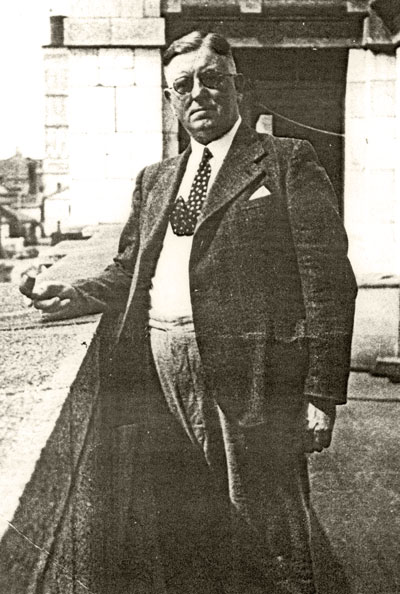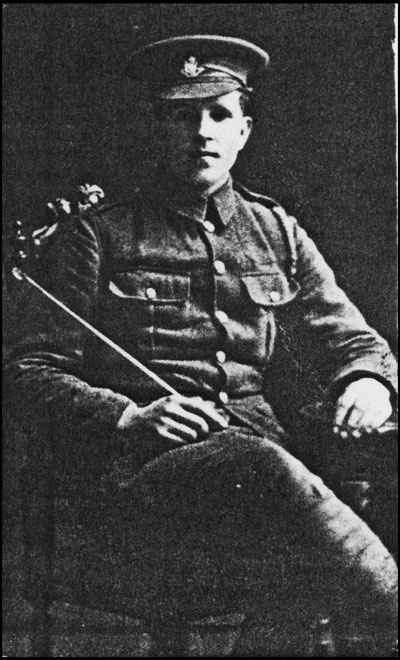Private Michael John (Jack) McGuigan
Michael John (Jack) McGuigan was born on 17 December 1892 at 12 Queen Street, Newry, County Armagh, the eighth of nine children of postman James McGuigan and his wife Bridget (nee Grant). By 1911 he was living with his family at Dromalane Road, Newry, and working as a shopman in a hardware business.
McGuigan enlisted in the North Irish Horse at Antrim on 13 October 1914 (No.1307) with his pal Frank McMahon. On 17 May 1915 at Antrim he was confined to barracks for three days for being absent off pass from watchsetting on 15 May until 8.30 pm the following day. Soon after, McGuigan proceeded to England with F Squadron. On 30 July at Hemel Hempstead he was again in trouble, this time for being drunk in town and improperly dressed, for which he was confined to camp for seven days.
On 17 November 1915 McGuigan embarked for France with F Squadron. There his disciplinary breaches continued. On 21 December he was awarded ten days' Field Punishment No.2 for being absent from roll call from 8.30 pm to 10.30 pm the previous day. He repeated the offence at the end of April 1916 and was awarded 9 days' Field Punishment No.2 and deprived of fifteen days' pay.
In June 1916 F Squadron joined with C Squadron and the 6th (Inniskilling) Dragoons Service Squadron to form the 2nd North Irish Horse Regiment, serving as corps cavalry to X Corps until August 1917, when the regiment was dismounted and most of the men transferred to the 9th (Service) Battalion, Royal Irish Fusiliers – renamed the 9th (North Irish Horse) Battalion. After a brief period of infantry training at the 36th Division's Infantry Base Depot at Harfleur, the men were formally transferred to the 9th Battalion on 20 September, joining it in the field at Ruyaulcourt five days later. McGuigan was issued regimental number 41237 and posted to D Company.
He saw action with the battalion at the Battle of Cambrai in November and December 1917. However he contracted trench fever and on 8 December was evacuated to England for treatment, at the County of Middlesex War Hospital, St Albans.
McGuigan had recovered sufficiently for home service after four months, joining the 10th (Reserve) Battalion, Royal Irish Fusiliers, on 8 April 1918, then the 3rd (Reserve) Battalion at Rugeley on 25 May. On 19 June he was posted to the 11th (Service) Battalion but prior to its departure for France the following month he was found to be still unfit for front-line service (B.3). He was therefore transferred to the Army Service Corps on 16 July (No.S/424911), working as a clerk at the Reserve Supply Personel Depot at Prees Heath, Salop, until 14 October when he was posted for duty as a clerk with the 6th Cyclist Brigade at the Curragh.
On 23 July 1919 McGuigan was transferred to Class Z, Army Reserve.
With the outbreak of war in September 1939 McGuigan sought to re-enlist, writing the following letter to the authorities from his home at Dromalane Road in Newry:
I would be grateful if you would kindly forward me a record of my service in the great war & medals entitled to have received. I joined the North Irish Horse in the town of Antrim N. Ireland on Oct 10th, 1914 regtl number 1307, arrived in France early 1915 later transferred Royal Irish Fusiliers then invalided to England afterwards placed in R.A.S.C. demobbed in Dublin after the war receiving pension for some time. Thanking you in anticipation of a early return which I require for the present crisis.
It is not known at present whether his application was succesful, but it is unlikely that the 46 year-old would have seen active service.
Jack McGuigan died on 17 March 1954 at the Royal Victoria Hospital, Belfast.

The above pictures were kindly provided by Anne Cosgrove of Newry.

